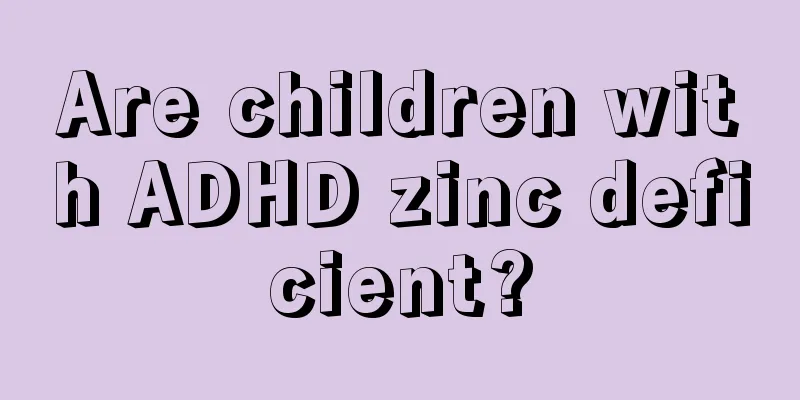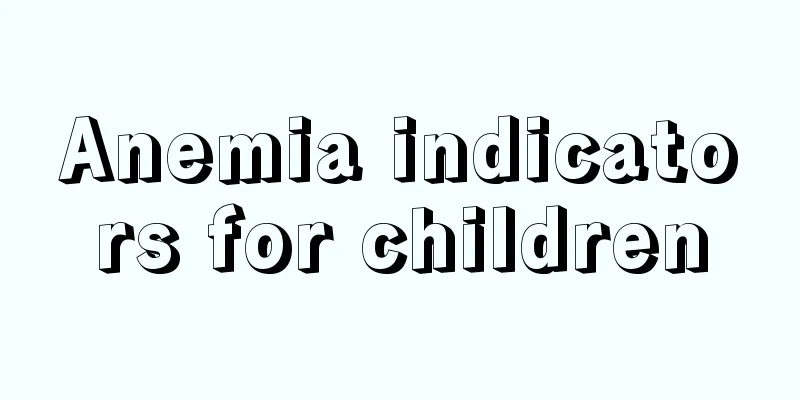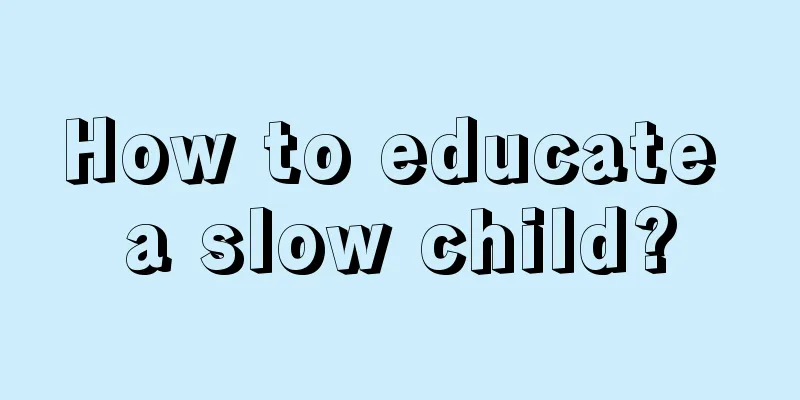Are children with ADHD zinc deficient?

|
ADHD is a disease that usually manifests itself in children, and the cause of ADHD is mostly closely related to the patient's fever, because in severe cases, fever is particularly likely to cause damage to brain tissue. After the brain tissue is damaged, our nerves will be disturbed, which can easily cause children to have ADHD. So, are children with ADHD zinc deficient? Can zinc deficiency in children cause ADHD? Attention deficit hyperactivity disorder, also known as mild brain injury syndrome, is a common disease among children. If ADHD is not treated in time, the harm it can cause can continue into adulthood. What are the symptoms of ADHD in children? The main manifestations of ADHD in children are inattention, lack of concentration, distraction, excessive movements, small movements in class, talkativeness, willful impulsiveness, emotional instability, poor self-control, procrastination, lack of time and task concept, uncoordinated movements, difficulty with fine movements such as threading a needle, buttoning, etc., disobedience to discipline, doing things one's own way, and in severe cases, stealing, lying, and fighting. Children with zinc deficiency are prone to anorexia, oral ulcers, short and thin stature, decreased immunity, frequent colds and fevers, intellectual development retardation, thinning and yellowish hair, etc. Some may also develop ADHD, so parents should pay attention to this. To prevent zinc deficiency, you should eat more foods rich in zinc. To supplement zinc, you can eat foods high in zinc. Dietary supplements rarely have side effects. Foods rich in zinc include: bran, lichens, mushrooms, fried sunflower seeds, fried pumpkin seeds, pecans, pine nuts, yogurt, beans, dried cuttlefish, snails, peanut oil, etc.; in addition, animal foods such as fish, eggs, meat, and poultry are high in zinc and have a high utilization rate. How to supplement zinc for babies The Chinese Nutrition Society recommends the following daily zinc requirements: 3 mg for infants from newborn to 6 months old; 5 mg for infants from 7 to 12 months old; 10 mg for children from 1 to 3 years old; 20 mg for pregnant women; 20 mg for nursing mothers; and 10 to 15 mg for normal adults. About 1/4 is absorbed, enters the plasma, combines with albumin and free amino acids, is taken up by liver cells, and attaches to metabolic enzymes. 20% is deposited in the hair, skin, and nails, and 50% is deposited in the liver. Zinc is excreted in bile. Zinc deficiency can increase blood ammonia and induce hepatic encephalopathy, and the patient may become unconscious. Zinc can maintain the activity of enzymes required for metabolism in the body, maintain the balance of acid and alkali metabolism and the normal reproductive function of the human body. At the same time, zinc deficiency has a significant impact on cellular immune function, which can cause a decrease in the total number of lymphocytes, making the patient susceptible to viral or bacterial infections, which is not conducive to disease recovery. Therefore, zinc supplementation should be done according to individual needs. Infants rely on breast milk for zinc supplementation. Breastfeed your baby for at least 3 months, and then gradually switch to cow's milk or other milk substitutes. The absorption rate of zinc in breast milk is high, reaching 62%. In particular, colostrum is high in zinc, with an average concentration 4-7 times that of serum zinc. After weaning, add zinc-rich food. Such as beef, mutton, lean pork, animal liver, peanuts, soybeans, carrots, oysters, etc. Children's zinc supplementation depends on balance. Children over 5 years old can get enough zinc from food. Therefore, children should be educated from an early age to develop good habits of not being picky or partial eaters, and should pay attention to a reasonable and balanced diet structure, and a mixture of coarse and fine grains. In this way, children generally will not be zinc deficient. In daily life, you should also be careful not to let your children eat too much white sugar and sweets, so as not to affect the absorption of zinc. Zinc drugs should never be regarded as universal "nutritional supplements" and used for a long time. Excessive zinc supplementation can also be harmful. Zinc poisoning causes nausea and vomiting. Gastrointestinal symptoms such as abdominal pain and diarrhea. This is because zinc is easily converted into zinc chloride in gastric juice, which is highly corrosive to the stomach and can cause congestion, edema, and erosion of the gastric mucosa, and even cause rupture and bleeding of gastric blood vessels; excessive zinc damages the liver, and severe cases will have symptoms of jaundice hepatitis; zinc poisoning can cause neuronal damage; damage to glial cells; excessive maternal zinc content can cause neural tube defects in the fetus; excessive blood zinc can inhibit the phagocytic function and bactericidal ability of white blood cells, reduce the body's resistance, and make it easy to be invaded by pathogenic bacteria; excessive zinc intake (more than 45 mg per day) will also hinder the absorption of divalent ions such as iron and copper, not only causing anemia, but also increasing cholesterol and uric acid in the body, as well as incomplete cross-linking between myocardial elastin molecules, increasing the risk of coronary heart disease and myocardial infarction; studies have also pointed out that excessive zinc intake can also increase the incidence and mortality of gastric cancer. Zinc is an essential trace element for our human body. Too little or too much will have adverse effects on the body, so please consume zinc in moderation. |
<<: Symptoms of ADHD in a three-year-old baby
>>: How to train a child with ADHD
Recommend
What is the pathogenesis of childhood follicular lymphoma?
Children have a very high status in today's s...
What are the reasons for slow teething in children?
What should I do if my child’s teeth grow slowly?...
Why does my child’s ear become red and swollen?
People often experience swollen and painful earlo...
What to do if your child vomits and has stomach pain
Parents with children at home will worry about th...
What should I do if my child has foot pain at night?
Children are usually more active, and excessive e...
Newborn glass bottle
Parents must pay close attention when choosing ba...
Treatment of urinary incontinence in children
Children's urinary incontinence has become a ...
Symptoms of cold abdomen in baby
For every family that has just had a baby, daily ...
Why do children have birthmarks when they are born?
After every expectant mother finds out she is pre...
Causes of knee pain in children
We know that knees are of great significance to t...
What to do if your baby has trouble breathing while sleeping
Babies have many common problems. To solve them, ...
What to do if your newborn baby catches a cold
Newborn babies are often susceptible to various d...
How to treat osteomyelitis in children
Osteomyelitis in children needs to attract the sp...
The reason why the child suddenly fainted is
Many people have experienced dizziness after stan...
What should a three-year-old child eat if he has constipation?
What should a three-year-old child eat for consti...









